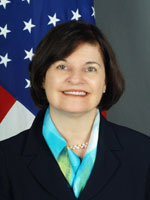Q and A with Ambassador Leslie V Rowe, MA, MED
May / June 2013 | Volume 12, Issue 3

Ambassador Leslie V. Rowe
Ambassador Leslie V. Rowe joined the new U.S. Office of Global Health Diplomacy in January 2013 to manage its day-to-day operations. Together with Ambassador Eric Goosby, she is supporting U.S. efforts to advance global health and move developing countries toward fully managing their health care needs.
Rowe is an experienced diplomat, having served as ambassador to Mozambique (2010-2012) as well as Papua New Guinea, Solomon Islands and Vanuatu (2006-2009). Her previous postings include stints in Kenya, Thailand, Portugal, Chile, Brazil and Costa Rica. She spoke recently at the Center for Strategic and International Studies (CSIS).
What are your goals for the new Office?
Our Office will support U.S. ambassadors and their teams, the deputy chiefs of mission, health teams and others to make global health a priority and part of the daily diplomatic dialogue that ambassadors engage in.
As Ambassadors, we have access to many different people at all levels of government and in communities, and have multiple opportunities to discuss global health. And so, for instance, if I was going to have a meeting with the president, the prime minster or the ministry of finance or health, I would always ask our country team: "I'm going to talk about 'X' but is there something we need to get more high-level attention on and can I raise that issue?" While such questions are already standard for many ambassadors, we want to make it even easier for them to do this by creating some tools that they can easily pull out of their toolbox, such as talking points and useful information. They will be promoting country ownership of health systems, health systems strengthening and also sharing responsibility with our partners and seeking donors or expanding their support.
How can all parties work more efficiently?
We are all concerned about the fiscal difficulties in this country and among our partners. We have to be sensitive to everyone's concerns, and we have to look for even better coordination among our partners to make sure the countries in which we are working are aware of all the resources available. In the U.S., we want to make sure that every dollar spent on our global health and assistance programs is being managed effectively. We take those responsibilities seriously and will be paying a lot of attention to this as we move more and more into country ownership, as countries take over all their own planning and implementation, all their monitoring and evaluating, and eventually manage all their expenditures in global health.
What's the importance of country ownership?
It's one of our major goals. We don't define it simply as ownership by the government. Country ownership runs throughout civil society, community groups, women's groups and local and nongovernmental organizations. We've relied on the national government for decades working with NGOs to implement our very effective health programs. Now it's definitely a thrust of embassies abroad to go out into the communities, because we feel it's at the local level, the community level, that people really take ownership and become advocates for their own global health. That will necessitate their putting pressure on their local officials and eventually national officials to provide the kind of health care that they really want.
How do collaborations advance global health?
Let me give you an example: While I was in Mozambique, we signed a trilateral agreement to work together with Mozambique, Brazil and the United States on health issues and also on food security, presenting a good example of participation of an emerging economy. I served in Brazil when it was a recipient more than a donor-partner and it's really gratifying to see this evolution, the way Brazil has taken responsibility for its global health and now is in the position to reach out to the Lusophone communities in Africa.
In addition to expanding partnerships with emerging economies, I also feel that we need to work more closely with the private sector. While we've had fantastic support from governments around the world, I think we can do more with private enterprise. There's tremendous interest among American companies to get engaged in Africa, and great opportunities there.
What backing does the new Office have?
We have very strong support, starting with Secretary John Kerry, who cares deeply about global health, and has a long track record of accomplishment on this issue in the Senate.
In his first public speech as Secretary, he talked about working toward an AIDS-free generation, eradicating polio, reducing maternal mortality and supporting efforts to avoid
malaria, TB and other diseases. It's a great start for our Office to have that kind of support from the top.
More Information
To view Adobe PDF files,
download current, free accessible plug-ins from Adobe's website.